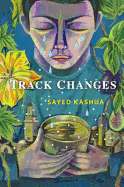
In Palestinian Israeli author Sayed Kashua's intriguing fourth novel, Track Changes, an Arab Palestinian family's crisis prompts questions about the veracity of telling one's own stories. Mitch Ginsburg returns for a second adept translation partnership, following Kashua's Second Person Singular, winner of the 2011 Bernstein Prize.
Kashua's unnamed narrator's life is complicated. He used to be a Jerusalem newspaper editor, but now he's living solo in an Illinois grad school dorm room, separated from his wife and their three children. He's written 30 books, but none of them bear his name. He's authored other people's memoirs--with varying degrees of accuracy, embellishment, even all-out fiction.
Fourteen years have passed since his father whispered to him on his wedding day that "he would never know love and asked not to see him until the day he dies." A Skype message from a Palestinian hospital reveals that death is now imminent. Father and son have secrets to reveal, memories to bare, bonds hopefully to reconnect. At the crux of their cleaving is the narrator's less-than-a-page-long, written-in-an-hour, published-in-a-student-journal, 15-year-old short story that demands final reckoning.
That Kashua's protagonist is a nameless "I" who shares considerable biographical overlaps suggests, perhaps even implies, the so-called truth of Kashua's first-person fiction. Yet his character, whose job is to transcribe others' memories onto the page, repeatedly reveals his elisions from and additions to strangers' memoirs-for-hire, often inserting his own memories as their own, thereby erasing his life in scattered pieces. For savvy, curious readers, that interplay of parsing fact and fiction proves to be a lively, interactive experience. --Terry Hong, Smithsonian BookDragon

